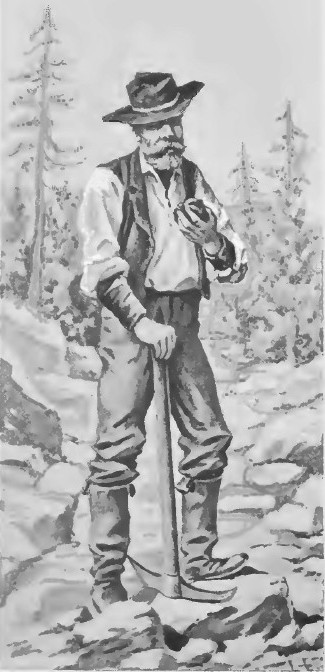In the dry seasons of '50-'53, when water was scarce in the placer mining districts, large numbers proceeded to prospect the beds of other rivers, both north and south, finding that almost every stream, from the Klamath, Trinity and Scott rivers of the North, to the Stanislaus and other rivers of the South, contained gold in paying quantities. Dams, ditches, tail races, wing dams and flumes were built at the most available points in the various rivers, and immense fortunes were realized by a few persons. River mining partakes of the same nature and character as other mining, and although the exact location was known in the river where the rich deposits were to be found, yet the trouble and expense, as well as the uncertainty and risk in getting it, offset to a great extent the value of the amount acquired ; for, in some cases, miners were compelled to dam and flue three and even four years in succession before being able to get to work among the pay gravel in the river bed. Frequent losses were entailed in consequence of the breaking away of dams, caused by rains in the mountains above coming upon them unexpectedly and carrying away flumes, tools, etc., just as everything was about ready for commencing the work of washing the pay dirt.
River mining, under favorable conditions is of a pleasing and exciting nature, and for this reason has great attraction for many; but such is the great uncertainty of success of this method of acquiring wealth, that although fully $50,000,000 of gold was being annually extracted from the mines and put into circulation, yet, strange and paradoxical as it may seem, a few years demonstrated the fact that the class who extracted the gold from the soil in the dry diggings, from tunnels in the old, ancient river beds, as well as from the present water courses, were the very ones who had, or who retained in their possession, the least amount.
The true explanation of this paradox, in my opinion, can be traced to the great expense attendant upon the business, and to the fact that the outgo continues at all times, while little or nothing is coming in ; an important factor being also an excessive freedom in the use of gold, for a miner who has a paying mine does not practice habits of economy ; he does not know how, and if he ever did it has slipped his memory. As the ravines, gulches and small creeks were now worked out, or at that point when they ceased to pay sufficient to warrant working, they were entirely abandoned. This gave to the mining regions a very desolate appearance; for in certain locations or districts where but a short time previous all was life and animation, and the clatter of the shovels upon the tom iron, the rush of water and gravel through the long sluices, and the laughter and jollity of the miners at work, evidencing the fact that fair wages were being made, could be heard, now the scene was changed and all was desolate and deserted. The numerous old cabins scattered around among the hills were silent, and tenantless, too; the old chimneys in some places were falling to the ground, and young pine trees were showing themselves among the ruins.
But again the scene changes; as afterward the Chinese, who had learned in their own country of the great wealth to be acquired here in so easy a manner, were on their way to honor the State with their company, and they soon flocked into the mining regions in swarms, well satisfied to work over the old abandoned claims left and deserted by others. They were welcomed by the mining community with open arms, as it was soon discovered that the Chinese would not preempt, or locate any new mining grounds, desiring only to buy at a fair price the old worked-out claims which had been abandoned. Here was the grand opportunity of the miner to re-locate and sell to the new emigrant these old mining claims; and well did these disciples of Contucius merit the title of scavengers of the mining regions, for many of the old claims which had been abandoned as worthless, were not so in fact, as it was soon discovered that from many of them the Chinese miners were taking out large amounts of gold.
The Chinese method of working a mining claim differed very materially from those typically used by the Americans, being of a more systematic character. It was their practice to commence and take everything clean as they went, leaving not an inch of ground behind them un-worked. They are very slow workers as compared with other races, but sure and steady, illustrating by their success in working these old claims the truth of the old adage that it is the steady mill that grinds the corn. So thorough was their work, that it would be entirely useless and a waste of time to work over any mining grounds that have been previously worked by a Chinese company, for they got it all. Some attempts to prevent the ingress of the Chinese into the mining regions by levying or enforcing the previously adopted "Foreign Miners' Tax," were made; but this they paid without a murmur, and in many cases two or three times over, for it was often the custom of some to go among them with fictitious papers, and collect their taxes in advance of the regularly licensed collector.

